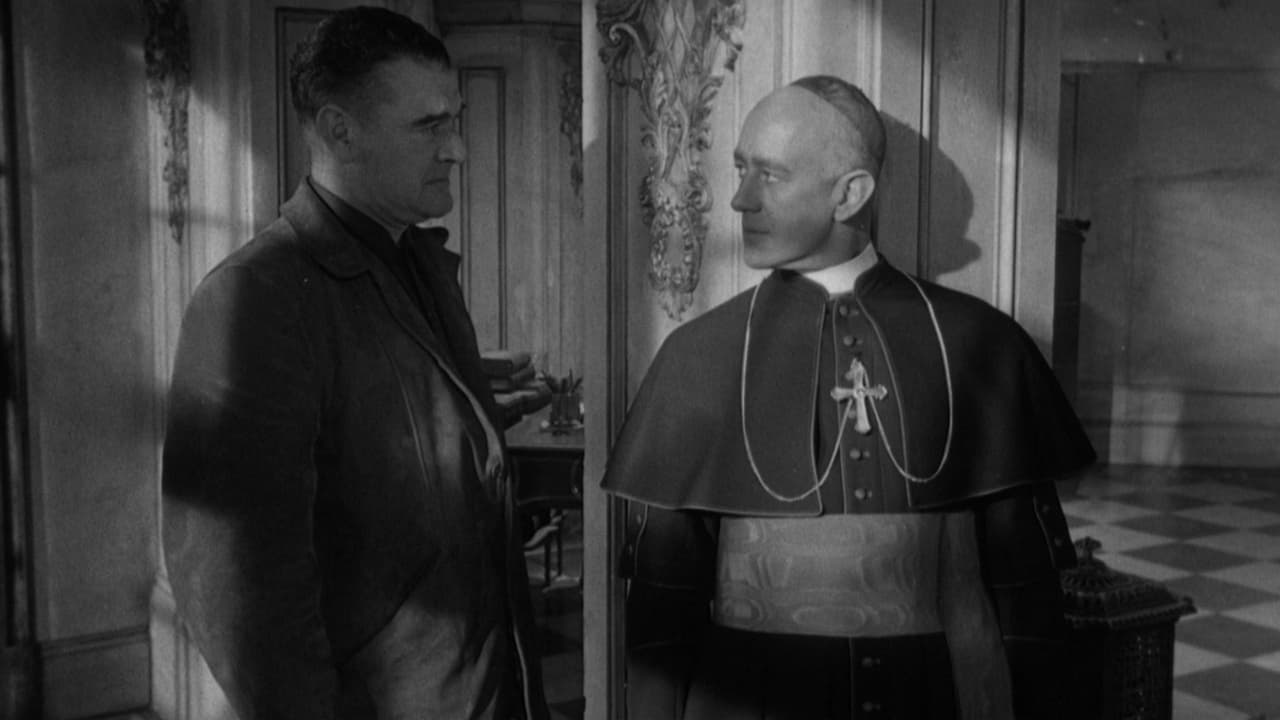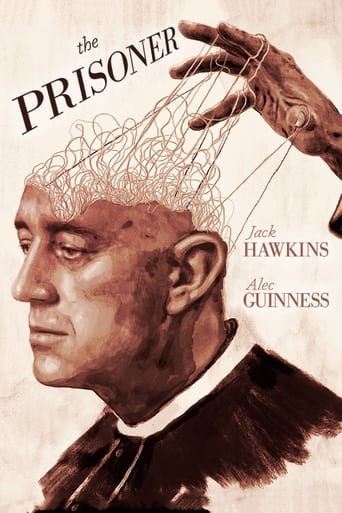

****SPOILERS*** Brought up on charges of treason against the state the Cardinal, Alec Guinness, of an Eastern European communist nation is put through the ringer by his Interrogator, Jack Hawkins, in order to get him to confess to his so-called crimes. The Cardinal who's an old hand at being tortured by the German Gestapo during WWII takes it all in stride not caring what is done to his body but when the Interrogator starts to work on his mind and his life as a young boy in the city fish market he strikes a raw nerve with the Cardinal.The Cardinal has done some bad things, like sticking his hand in the cookie jar, in the past before he became religious and it's his former comrade in arms, against the Nazis, in WWII, the Interrogator who brings those events out into the open. It takes some three months for the Interrogator to get the Cardinal to crack with days of sleep deprivation and weeks of isolation but in the end the Cardinal finally gives in to all of his demands.***SPOILERS*** At his trial the Cardinal confesses to everything, even the Lincoln and Julius Cesar assassinations, under the sun in an open court with those in attendance, mostly the Cardinal's supporters, open mouthed and shocked by his many false and mindless confessions. It didn't take long for the smug with victory Interrogator to realize that all his efforts in getting the Cardinal to confess backfired in his face! The vary fact that the Cardinal so eagerly confessed to all if not even more of the crimes that he was accused of by the state showed the people that he was just playing along with his captors and in fact showing them up for the brutish thugs whom they are. With his conviction thrown out and confessions shown to be total lies and BS it's the Cardinal who in fact got the last laugh not the Interrogator and his superiors. And with that the Cardinal walks out free as a bird or cardinal from prison to the cheers of all the people who were tried to be made out, by the Interrogator, that he betrayed!
... View MoreIt is difficult to understand why the producers thought that this talky snail pace drama was more appropriate to the cinema than TV.Didn't cinemas already have enough problems without screening this hall clearing feature.In fact the only reason that I watched it was to see one of my favourite actors,Wilfred Lawson.there sure enough he was acting his socks off whilst Alec Guiness was doing his silent bit.He lights up every scene he appears in.He has this funny knack of starting each sentence on a high note and working his way down.As for the rest of the film,sorry to say it is a total bore.Jack Hawkins was always watchable but Alec Guiness I find a little of him goes a long way.Guiness is not necessarily good for you.
... View MoreThis little black and white gem features Alec Guinness("Lawrence of Arabia" "Star Wars-A New Hope") and Jack Hawkins("Ben Hur") as the opposing sides in a subtle film of brainwashing and psychological torture. Guinness is the Cardinal, a cold, authoritarian leader of the church against the state. Hawkins is the specialist who must break him in a very short period of time to embarrass the church and remove it's power with the people. Both men are destined to come out of the experience changed forever. With a fine supporting cast, the film is centered on these two very strong performances which give the cold war a brand new meaning.
... View MoreThough the wonderful Wilfred Lawson gives a good turn as a jailer, this is basically a two-man show, based on a play. The two men are fine actors: Alec Guinness, as the beloved Cardinal arrested by the state in a generic Eastern European Cold War setting; and Jack Hawkins, as the state inquisitor, trying to coerce the Cardinal into making untrue confessions for a show trial.Both men are brilliant, though Guinness is perhaps too impenetrable, not only for his inquisitors, but for the audience. Hawkins' character and Guinness's worked together in the Resistance against the Nazis; since then, Hawkins has become a high Communist official trying to eradicate the church from public life.At first, the movie seems like a cat-and-mouse game between two fanatics, though erudite and educated fanatics, one believing in the church and the other in the ultimate power of the state. Hawkins keeps his well-practiced geniality, though, while Guinness, under mental torture (Hawkins knew Guinness had suffered physical torture under the Nazis and was inured to it) begins to show cracks.While the movie is hardly a cliff-hanger, and doesn't discuss religion or even totalitarianism in any great depth, the performances by the leads are intense, and worth watching for the acting alone, even though one may be puzzled by what it's all about.
... View More